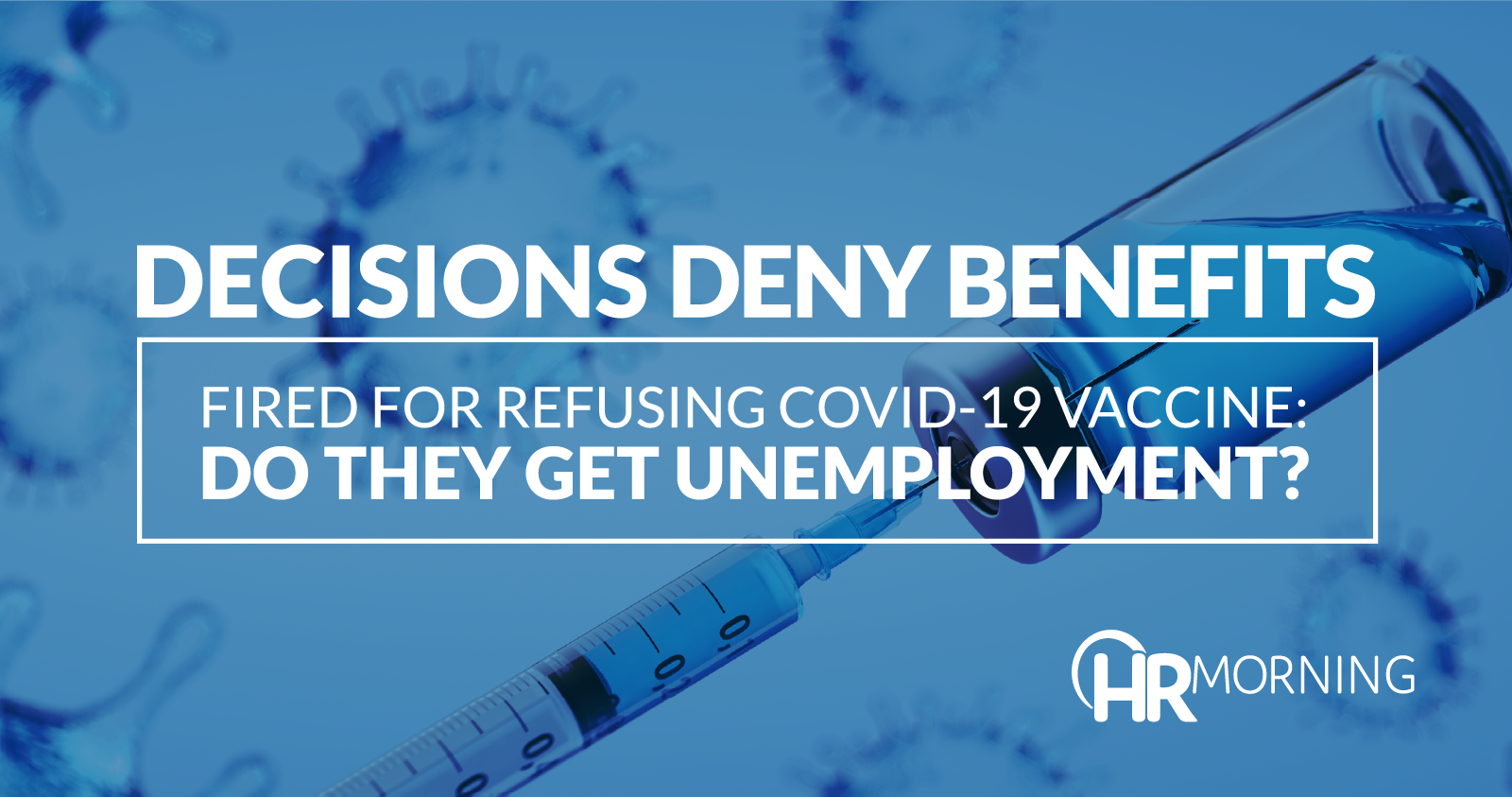An employee who is fired for refusing to get a COVID-19 vaccine – without showing entitlement to a legitimate religious or disability-related exemption – is likely to have a hard time collecting unemployment compensation benefits, two recent court rulings show.
Though each state sets its own specific eligibility guidelines, these two rulings from Minnesota hinge on a widely applicable and basic unemployment law principle: Discharged employees are not entitled to receive unemployment compensation benefits if they are discharged for misconduct.
Whether the conduct leading to employment separation meets the definition of disqualifying “misconduct” is often at the heart of unemployment compensation disputes. In these two decisions, the question was whether the employee’s refusal to receive the COVID-19 vaccine – as required by employer policy – was disqualifying misconduct under the relevant state law.
In both cases, the court found that the employee engaged in misconduct and thus was not entitled to benefits.
First case: Employer requires COVID-19 vaccine
The first case involved Julie Costello, who was a front-desk employee for the Fond Du Lac Reservation. In that position, Costello had “ample contact” with the public and other employees, the court’s decision in the case noted.
In mid-September of 2021, Fond Du Lac told its employees in the human services division that they needed to get their first dose of the COVID-19 vaccine by the start of October – and the second dose by the beginning of November. Employees needed to get vaccinated if they wanted to keep their jobs, although they could seek a medical or religious exemption from the vaccine requirement.
Costello resisted, saying she believed the vaccine is not needed “if you’re a healthy person and you don’t get sick and you don’t go to the doctor and you don’t take medication.”
But she did not seek a medical or religious exemption, insisting that she led a healthy lifestyle while adding that she is not a religious person.
Fond Du Lac terminated her employment after she missed the first vaccine deadline, and she filed for unemployment compensation benefits. An unemployment law judge rejected her application, finding that her refusal to be vaccinated amounted to misconduct that disqualified her from receiving benefits.
On appeal, the court upheld that determination. The mandatory vaccination policy was reasonable, it said, as it was implemented for health and safety reasons.
Costello’s opinions about COVID-19 did not make the employer’s policy unreasonable, the court added.
The court thus affirmed the decision that Costello was not entitled to benefits.
Second case: Different facts, same result
The employee in the second case was Shelbi Logue, who sold medical devices to healthcare providers for Olympus America Inc.
In August of 2021, Olympus told its field employees, including Logue, that COVID-19 vaccination was a job requirement.
Logue sought a religious exemption from the vaccination requirement, saying that her religious beliefs compelled her to refuse the vaccine. In her request, she called the vaccine “an experiment” and “unsafe.”
When Olympus pressed her about how her religious practices prevented her from getting the vaccine, she said her faith dictates that she must avoid “receiving foreign toxins with harmful or unknown effects, while also maximizing nutrition and cultivating a healthy natural immune system in accordance with God’s design.”
Unconvinced, Olympus terminated her employment for refusing to get the vaccine.
When she applied for unemployment benefits, a state commission denied them based on a finding that her refusal to be vaccinated constituted disqualifying misconduct. An unemployment law judge found that Logue’s objection was secular rather than religious. The judge decided that her refusal to be vaccinated was based on her personal beliefs and her desire to wait until she was done nursing to get the vaccine.
On appeal, the court affirmed. There was substantial evidence that Logue’s refusal to be vaccinated was based on secular rather than sincerely held religious beliefs, it said.
The court also noted that Logue’s doctor declined to support her request for a medical exemption.
The decision to deny Logue unemployment benefits was affirmed.
Important caveat for employers
In both cases, the employee was unable to prove entitlement to an exemption from the employer’s generally applicable vaccine requirement. In one, it was undisputed that she did not seek a medical or religious exemption. In the other, the court accepted an unemployment law judge’s finding that the employee’s refusal to be vaccinated was not based on a sincerely held religious belief.
The results in these cases do not, however, relieve employers of their responsibility to thoroughly evaluate requests for disability-related or religious requests for exemptions from a generally applicable COVID-19 vaccination requirement.
The cases are Costello v. Fond Du Lac Reservation, No. A-22-0218, 2022 WL 3348567 (Minn. Ct. App. 8/15/22) and Logue v. Olympus America Inc., No. A22-0282, 2022 WL 3581809 (Minn. Ct. App. 8/22/22).


